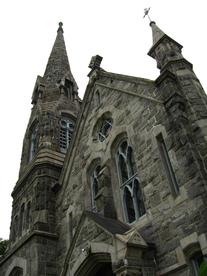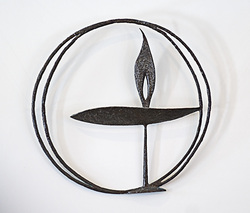
Like many religious liberals, I tend to distrust institutions, partly because of the power they hold. My uneasy relationship with power is rooted in childhood experiences of authority figures who misused and abused it. As an adult, at times my conflicted feelings about power manifest as trying to control others, and at others as giving power over my life to someone else. At times my unease with power leads me not to speak up when I should, and at others it leads me to push my agenda when I shouldn’t. Finding the right balance between those extremes has been a difficult and often painful process of making mistakes, making amends, and trying again.
Mae West once said, “Marriage is a fine institution, but I’m not ready for an institution yet!” Many of us may feel the same way about the institutions of organized religion. There’s good reason for that. Institutions are made of human beings and subject to the weaknesses of the human character. Deep down I don’t think religion per se is to blame for this. I think the core problem is a human tendency to “draw power to ourselves in the name of things that cannot be questioned,” as children’s author Phillip Pullman puts it. Humans have used different excuses to misuse power, including nationalism, racial pride, and religion.
The best human institutions, and I rank the Unitarian Universalist Association among them, build in ways to point out, correct and balance power. This is exactly what is happening in demonstrations around the world. Protesters are speaking the truth that some of the world’s leaders are abusing power. Protesters are demanding institutions that are humble and responsive, that serve rather than rule, that exercise power with others rather than power over others.

A few years ago my son did a report on String Theory. This theory holds that everything in the universe, including solid objects, is made up of tiny strands of energy. It’s all energy, all around. Everything is energy, and another word for energy is power. So perhaps everything in the universe is power - us, our institutions, the way we interact. It’s all power, all connected, woven into the fabric of our existence.
If in fact we channel and express power in everything we do, it is really important to make our hearts, spirits, and institutions as free as possible of internal obstacles that misdirect and distort power. That way, when power flows through us and through our institutions, it can move in positive ways. One way we unite spirituality to ethics (an important function of religious institutions) is to strive to become better channels of power in a deeply interconnected global community.
There is so much amiss in our world. It can feel overwhelming. We gather in faithful institutions to watch the events of our day unfold and to seek ways to respond. When we come together, knowing we are deeply connected, and strive together to become better, clearer channels of power, we give birth to something new. We give birth to faithful institutions through which power moves in ways that affirm, include, heal, and create justice. May it be that the struggles of our times are the labor pains of the births of institutions of justice, the serve the common good.
 RSS Feed
RSS Feed